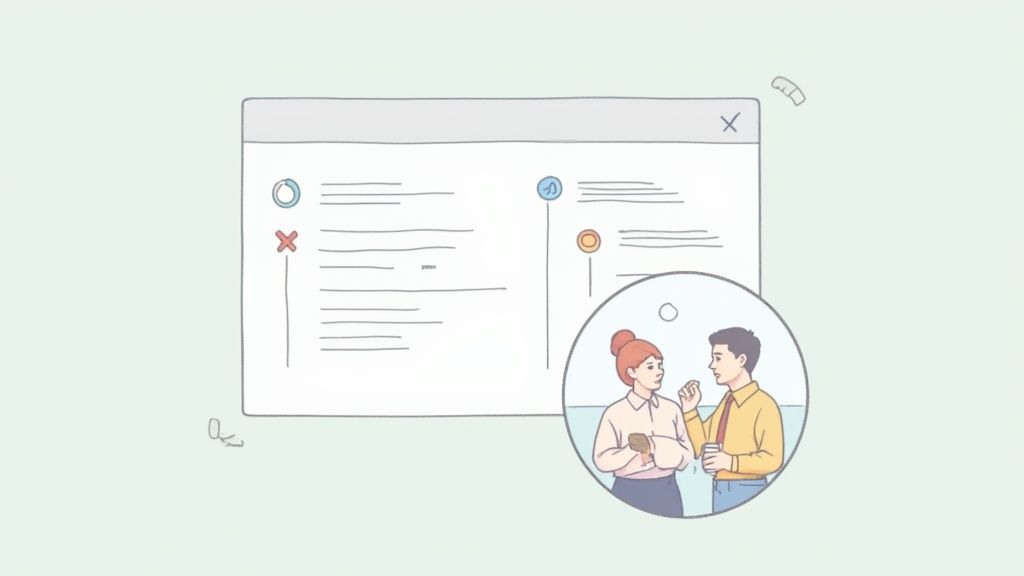Hiring a great Program Manager (PgM) is more than just matching skills on a résumé; it's about finding a strategic leader who can orchestrate complex, cross-functional initiatives and drive business outcomes. In a competitive market, asking the right questions is your most powerful tool to distinguish a good candidate from a truly exceptional one. This […]

Hiring a great Program Manager (PgM) is more than just matching skills on a résumé; it's about finding a strategic leader who can orchestrate complex, cross-functional initiatives and drive business outcomes. In a competitive market, asking the right questions is your most powerful tool to distinguish a good candidate from a truly exceptional one. This guide moves beyond generic queries to provide a strategic blueprint for your interview process, ensuring you identify the best possible fit for your team.
This article delivers a comprehensive list of the most critical interview questions program manager candidates should master. We will dissect each question, revealing its true intent and the core competencies it assesses. For every query, you will find:
Many of these questions are behavioral, designed to uncover how a candidate has handled real-world situations. For those looking to sharpen their approach, understanding how to prepare for behavioral interviews is a crucial first step for both interviewers and interviewees. This structured framework will help you identify individuals with the right blend of strategic foresight, operational discipline, and leadership acumen. Whether you're hiring for a junior role or a senior leader, these questions will help you build a world-class program management team.
This foundational question is more than a simple icebreaker; it’s a strategic opener designed to assess a candidate's high-level communication skills and the breadth of their experience. It serves as a gateway, allowing the interviewer to gauge the candidate’s career trajectory, the scale and complexity of the programs they have handled, and their overall suitability for the role. This is a critical first-look among interview questions for a program manager as it sets the stage for the rest of the conversation.

The interviewer is listening for a concise yet comprehensive summary that highlights key responsibilities, methodologies, and achievements. A strong answer will touch upon the types of projects managed, the size of the teams they led, the budgets they oversaw, and the industries they've operated in.
"In my previous role at a SaaS startup, I managed the end-to-end launch of a new analytics platform, a $2M program spanning 18 months. I led a cross-functional team of 25, including engineers, designers, and marketers, across three different time zones. My primary responsibility was to align all project timelines, manage stakeholder communications, and mitigate risks to ensure we met our go-to-market deadline, which we successfully did, resulting in a 15% increase in user adoption in the first quarter."
This response is effective because it’s specific, data-driven, and highlights leadership. The candidate clearly outlines the budget, team size, duration, and measurable business impact, providing a solid foundation for deeper follow-up questions.
This question directly probes a program manager's core operational capabilities: their organizational skills, strategic thinking, and ability to maintain control under pressure. Interviewers use this to understand a candidate’s methodology for juggling competing demands, allocating resources effectively, and communicating priorities to stakeholders. It’s a vital question among interview questions for a program manager because it reveals their system for turning chaos into an orderly, executable plan.

A top-tier candidate will go beyond simply listing tasks. They will describe a systematic framework for decision-making, showcasing their ability to align daily activities with overarching strategic goals. This is also an opportunity to discuss the tools they leverage, from project management software to prioritization matrices, and how they foster strong developer productivity.
"I prioritize using a combination of the Eisenhower Matrix and value-impact scoring. For daily tasks, I categorize everything by urgency and importance to ensure I'm focused on what truly drives the program forward. For larger project initiatives, I collaborate with stakeholders to score each item based on its potential business value and the level of effort required. This creates a data-backed roadmap that I manage in Jira, giving the entire team visibility. When priorities shift, my first step is always to communicate the 'why' to the team and adjust our sprint goals accordingly, ensuring everyone remains aligned and motivated."
This answer is excellent because it names specific, recognized frameworks, demonstrating a structured and thoughtful approach. The candidate shows they can operate at both a micro (daily tasks) and macro (project initiatives) level, while emphasizing transparent communication, which is crucial for a program manager. The mention of tools and stakeholder collaboration provides a complete picture of their capabilities.
This technical question moves beyond general program oversight to assess a candidate's practical experience with specific frameworks. As Agile methodologies become standard for fast-paced development, understanding a candidate's fluency in sprints, ceremonies, and iterative progress is crucial. This is one of the most important interview questions for a program manager in tech-focused organizations as it reveals their ability to facilitate modern, adaptive workflows.

Interviewers are probing for more than just textbook definitions. They want to see evidence that the candidate has actively participated in or led Agile teams, managed backlogs, and used frameworks like Scrum or Kanban to deliver value incrementally. A strong answer will demonstrate a deep understanding of Agile principles and the ability to apply them in real-world scenarios. Familiarity with the various roles in Agile software development is also a key indicator of experience.
"At my last company, I transitioned a 15-person engineering team from a traditional Waterfall model to Scrum. I acted as the Scrum Master, facilitating all ceremonies, including two-week sprint planning sessions where we used story points for estimation. I managed the product backlog in Jira, working closely with the product owner to prioritize features. A key success was implementing sprint retrospectives that led to a 20% improvement in our team's velocity over three months by identifying and removing key blockers in our CI/CD pipeline."
This response is powerful because it shows direct, hands-on experience and measurable results. The candidate doesn't just define Scrum; they provide a specific example of its implementation, detailing their role, the tools used, the team size, and the quantifiable positive impact it had on team performance. This demonstrates both tactical knowledge and strategic leadership.
A program’s success rarely hinges on technical execution alone; it often depends on the program manager's ability to navigate the complex web of human relationships. This question directly targets a candidate's interpersonal and political acumen, revealing how they manage expectations, align disparate groups, and maintain momentum by keeping key individuals informed and engaged. It's a cornerstone among interview questions for a program manager because it uncovers critical soft skills.

Interviewers want to understand the candidate's strategic approach to communication. A strong answer will go beyond simply stating "I send regular emails." It will demonstrate a proactive and tailored communication strategy, acknowledging that different stakeholders have different needs, interests, and levels of influence.
"My approach to stakeholder management is built on a structured communication plan. For my last program, I started by creating a stakeholder map, identifying key players and their influence and interest levels. For our C-suite, I provided bi-weekly, high-level dashboards focusing on ROI and key milestones. For the engineering teams, I ran daily stand-ups and maintained detailed documentation in Confluence. When our marketing and product teams had conflicting feature priorities, I facilitated a workshop to align them on business impact, using data to drive a consensus on the Q3 roadmap, which prevented a major delay."
This response is powerful because it showcases a repeatable, strategic process (stakeholder mapping). The candidate provides concrete examples of tailored communication for different audiences and demonstrates proactive conflict resolution, proving they can handle the political complexities inherent in program management.
This behavioral question is designed to evaluate a candidate’s resilience, accountability, and problem-solving skills under pressure. How a program manager handles adversity is often more telling than how they handle success. It reveals their capacity for self-reflection, learning from mistakes, and implementing corrective actions to prevent future issues. This question is a staple in interview questions for a program manager because it tests for emotional maturity and a proactive mindset.
The interviewer wants to hear a story that follows a clear narrative, ideally using the STAR method (Situation, Task, Action, Result). A strong response will candidly describe a real failure or significant setback, detail the specific actions taken to address it, and, most importantly, articulate the lessons learned and how they were applied moving forward.
"In a previous program, we faced a major budget overrun of 20% due to an initial underestimation of third-party vendor costs. My task was to get the program back on track without compromising key deliverables. I conducted an immediate audit of all expenditures, renegotiated terms with two vendors, and reprioritized a set of 'nice-to-have' features for a later phase. The result was that we contained the overrun to 12% and still delivered the core product on schedule. Crucially, I implemented a more rigorous vendor vetting and forecasting process for all subsequent projects, which has since prevented similar issues."
This is a powerful answer because it demonstrates ownership, clear action, and tangible learning. The candidate doesn't just describe the problem; they detail their specific corrective actions and the systemic process improvement that resulted from the failure. This shows a mature and proactive approach to program management challenges.
This question moves beyond execution and into strategic thinking. An interviewer uses this prompt to determine if a candidate’s definition of success is purely tactical (on time, on budget) or if it aligns with broader business objectives and value creation. Among the various interview questions for a program manager, this one is crucial for revealing a candidate's business acumen and their ability to connect program activities to tangible outcomes.
A strong program manager understands that success is multi-faceted. It’s not just about meeting the triple constraint of scope, time, and cost; it's also about stakeholder satisfaction, quality, team health, and ultimately, the impact on the business's bottom line. The answer should reflect a holistic and mature understanding of program value.
"I define program success on two levels: delivery success and business success. Delivery success is about meeting the traditional metrics: completing the program on time, within budget, and to the agreed-upon scope and quality standards. For a recent platform migration, we tracked this using earned value management and had a 98% on-time completion rate for our milestones. However, the more critical part is business success, which we measured through post-launch KPIs. In this case, our goals were a 20% reduction in server costs and a 15% improvement in application response time, both of which we exceeded within three months of launch. This two-tiered approach ensures we’re not just shipping a project, but delivering real value."
This answer is excellent because it demonstrates a sophisticated, two-pronged approach to defining success. The candidate provides specific, quantifiable examples for both delivery and business metrics, showing they are both a skilled executor and a strategic business partner. They also showcase familiarity with specific methodologies like earned value management, which adds credibility. To explore this topic further, you can learn more about KPIs for software development.
A program manager's success is intrinsically linked to the performance and growth of their team. This question moves beyond project execution to probe a candidate's leadership philosophy and their ability to nurture talent. It's a key part of evaluating interview questions for a program manager because it reveals their capacity to build a high-performing, sustainable team, which is crucial for long-term program success.
The interviewer is looking for evidence of genuine mentorship, not just management. A strong candidate will discuss how they identify individual strengths, create development opportunities, provide constructive feedback, and celebrate team successes. They should be able to articulate a clear strategy for fostering both individual and collective growth.
"In my last role, I directly managed a team of five project managers. I implemented a formal professional development plan for each, tying their personal goals to our program objectives. For one junior PM struggling with stakeholder management, I paired them with a senior PM and created opportunities for them to lead smaller stakeholder meetings. Within six months, they were confidently managing their own high-profile project stream and later received a promotion. I also believe in empowering the team, so I established a rotational 'lead' role for our weekly program syncs to build everyone's presentation and leadership skills."
This is a strong answer because it provides a specific, structured example of mentorship and its positive outcome (promotion). It showcases a proactive and thoughtful approach to team development, demonstrating the candidate's ability to not only manage tasks but also to invest in and grow their people.
This practical question aims to gauge a candidate's technical fluency and their ability to integrate into your existing technology stack. In an era of digital transformation and remote work, a program manager’s proficiency with specific tools can directly impact team productivity, communication, and overall program efficiency. This query is one of the more tactical interview questions for a program manager but reveals strategic thinking about process optimization.
The interviewer is looking for more than just a list of software. A strong candidate will connect their tool proficiency to specific outcomes, such as improving reporting accuracy, streamlining workflows, or enhancing collaboration across distributed teams. It’s a chance for them to show they are not just a user of tools, but a master of them.
"I have expert-level proficiency in the Atlassian suite, particularly Jira and Confluence, which I've used for the last five years to manage complex software development roadmaps. For example, I implemented custom Jira dashboards and automated reporting that reduced the time my team spent on status updates by 20%. I'm also skilled with Smartsheet for high-level program tracking and financial reporting, and I use Tableau to create stakeholder-facing dashboards that visualize program health against our core KPIs. I'm always eager to learn new systems and typically feel comfortable with a new tool within a week."
This answer excels by demonstrating both breadth and depth. The candidate names specific, relevant tools, quantifies the impact of their usage, and showcases their ability to leverage technology for strategic gains. Crucially, they also express a proactive attitude towards learning, which mitigates any potential gaps in their current toolset.
Scope creep is the silent project killer, and this question directly probes a candidate's ability to defend program boundaries while accommodating necessary evolution. It’s a tactical inquiry designed to reveal their process-orientation, negotiation skills, and foresight. How a candidate answers this question is a strong indicator of their ability to maintain control over a program's trajectory, budget, and timeline.
The interviewer is looking for a structured, proactive approach rather than a reactive one. A strong response will describe a formal change management process, emphasizing communication and impact analysis. This is one of the most practical interview questions for a program manager as it reflects a daily reality of the role.
"I manage scope creep through a formal change control process. When a stakeholder requests a new feature, they must submit a formal change request form detailing the business justification. My team and I then conduct a thorough impact analysis, quantifying the effect on the project's timeline, budget, and required resources. I present these findings to our change control board. For one project, a major stakeholder wanted to add a new reporting module mid-sprint. My analysis showed it would cause a six-week delay. I presented this data, along with an alternative to include it in a subsequent release, which the board approved. This protected our launch date while still acknowledging the stakeholder's need."
This answer is excellent because it outlines a clear, professional process. It demonstrates the ability to perform impact analysis, communicate effectively with stakeholders, and make data-driven decisions that balance project constraints with business needs. The specific example adds significant credibility and showcases practical experience.
A program's success is often determined not by how well it runs when things go right, but by how it weathers challenges when things go wrong. This question is designed to evaluate a candidate's foresight, strategic thinking, and ability to protect a program from potential threats. It moves beyond simple problem-solving to proactive identification and mitigation.
The interviewer is looking for a structured approach to risk management, not just anecdotal evidence of putting out fires. A strong answer will demonstrate a clear process for identifying, assessing, prioritizing, and creating contingency plans for potential risks throughout the program lifecycle. This is a crucial topic within interview questions for a program manager as it highlights a candidate's ability to ensure program stability.
"In my last program, which involved integrating a third-party payment gateway, I established a risk register from day one. A major risk I identified early was the dependency on the vendor's development timeline, which we had no direct control over. I rated it high-impact and high-probability. To mitigate this, I built a buffer into our schedule, established weekly technical check-ins with the vendor, and developed a 'Plan B' to use an alternative API with fewer features if they missed their critical deadline. This proactive planning prevented a three-week slip in our final launch date."
This response is excellent because it details a specific risk and demonstrates a complete management cycle: identification, assessment (high-impact/probability), mitigation (buffer, check-ins), and contingency (Plan B). It showcases a proactive, strategic mindset rather than a purely reactive one, directly linking their actions to a positive program outcome.
| Question | Implementation complexity | Resource requirements | Expected outcomes | Ideal use cases | Key advantages |
|---|---|---|---|---|---|
| Tell Me About Your Experience Managing Projects | Low — open‑ended | Minimal — interviewer time, follow‑ups | Broad view of career scope, project types, leadership | Screening and baseline assessment for all levels | Authentic background insight; highlights achievements |
| How Do You Prioritize Tasks and Manage Multiple Projects? | Medium — requires process detail | Moderate — examples, tool discussion | Reveals prioritization method, time management, tool use | Roles with concurrent projects or heavy multitasking | Shows decision‑making, practical organization methods |
| Describe Your Experience with Agile and Scrum Methodologies | Medium — technical/process focus | Moderate — verify ceremonies, metrics, artifacts | Assesses Agile practices, sprint experience, backlog management | Tech teams, iterative development environments | Validates modern PM frameworks and practical experience |
| How Do You Handle Stakeholder Management and Communication? | Medium — scenario based | Moderate — examples of interactions and outcomes | Evaluates communication style, conflict resolution, influence | Cross‑functional roles, senior PMs, high‑stake projects | Predictive of relationship management and political acumen |
| Tell Me About a Time You Failed or Faced a Significant Challenge in a Project | Medium‑High — behavioral depth | Moderate — probing to assess authenticity | Reveals accountability, learning, resilience | Senior hires, leadership assessment, culture fit interviews | Provides authentic character and growth mindset evidence |
| How Do You Define and Measure Project Success? | Medium — strategic focus | Moderate — KPI examples and alignment evidence | Shows business alignment, metrics literacy, ROI thinking | Roles requiring strategic alignment and reporting | Demonstrates measurement mindset and accountability |
| Describe Your Experience Leading and Developing Team Members | Medium — leadership focus | Moderate — examples of mentorship outcomes | Assesses coaching, development philosophy, promotion impact | People‑manager roles and scaling teams | Predicts long‑term team performance and retention |
| What Tools and Technologies Are You Proficient With? | Low — factual listing | Low — tool names, proficiency levels, demos | Identifies tool familiarity and adaptability | Remote/distributed teams, tool‑centric environments | Easy to verify; indicates readiness for org tools |
| How Do You Handle Scope Creep and Manage Change Requests? | Medium — process and negotiation | Moderate — examples of change control and impact analysis | Reveals change control rigor, negotiation, boundary setting | Projects with evolving requirements or frequent change | Protects project viability; shows pragmatic governance |
| Tell Me About Your Experience with Risk Management and How You Handle Risks | Medium — strategic/operational | Moderate — risk registers, mitigation examples | Shows foresight, prioritization of risks, contingency planning | Large, complex, or enterprise projects | Prevents costly surprises; indicates planning maturity |
You now possess a comprehensive toolkit designed to deconstruct the complex role of a Program Manager into a series of targeted, insightful interview questions. This guide moves beyond simply listing what to ask; it provides a strategic framework for understanding the why behind each query, equipping you to evaluate responses with precision and confidence. The goal is not just to fill a role but to find a leader who can orchestrate complex initiatives, inspire cross-functional teams, and translate your company's strategic vision into tangible results.
The collection of interview questions for a program manager provided here is more than a checklist. It is a diagnostic tool. By probing into areas like stakeholder management, risk mitigation, and strategic alignment, you gain a multi-dimensional view of a candidate's capabilities. You're not just assessing their past accomplishments; you're simulating the future challenges they will face within your organization and gauging their potential to navigate them successfully.
To truly elevate your interview process, distill the learnings from this guide into a few core principles. These are the strategic pillars that support a successful hire:
Armed with this knowledge, your next step is to operationalize it. Don't let this guide become another unread browser tab. Put it into action immediately.
Strategic Advantage: Remember, conducting an effective interview is your competitive advantage in a fierce talent market. The thoroughness of your process signals to top candidates that you are a serious, well-organized company that values high-caliber talent.
Ultimately, your goal is to find a Program Manager who will be a force multiplier for your entire organization. They are the connective tissue that holds complex, multi-faceted initiatives together. The rigor you apply to your search for this pivotal role will be directly reflected in your company's ability to execute, innovate, and scale. By leveraging this structured approach to interview questions for a program manager, you are not just hiring for a role; you are making a strategic investment in your company’s future success.
C# unit testing is all about writing small, targeted tests to make sure individual pieces of your code—your "units"—are working exactly as they should. Think of it as your first line of defense. It's a safety net that catches bugs early, makes refactoring way less scary, and helps you ship features with confidence. The big […]

Careers in cryptography are high-stakes, high-reward. These are the people who build and break the digital codes that secure our world, protecting everything from your bank account to global decentralized networks. It's a field with massive growth and serious six-figure salary potential. Why Cryptography Careers Are Exploding Welcome to the new frontier of digital trust. […]

The demand for remote machine learning jobs isn't just a trend anymore; it's a fundamental shift in how AI talent is hired and deployed. For ML professionals, this opens up a world of possibilities, not just in terms of flexibility, but also significant financial upside. Companies are in a fierce competition for top talent, and […]
